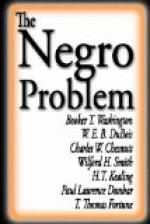Under the circumstances, there is no alternative for the Negro citizen but to work out his salvation under the Constitution, as other citizens have done and are doing. It will be a long and tedious process before the equitable adjustment has been attained, but that does not much matter, as full and fair enjoyment of civil and political rights requires much time and patience and hard labor in any given situation, where two races come together in the same governmental environment; such as is the case of the Negro in America, the Irishman in Ireland, and the Jew everywhere in Europe. It is just as well, perhaps, that the Negro will have to work out his salvation under the Constitution as an individual rather than as a race, as the Jew has done it in Great Britain and as the Irishman will have to do it under the same Empire, as it is and has been the tendency of our law and precedent to subordinate race elements and to exalt the individual citizens as indivisible “parts of one stupendous whole.” When this has been accomplished by the law in the case of the Negro, as in the case of other alien ethnic elements of the citizenship, it will be more gradually, but assuredly, accomplished by society at large, the indestructible foundation of which was laid by the reckless and brutal prostitution of black women by white men in the days of slavery, from which a vast army of mulattoes were produced, who have been and are, gradually, by honorable marriage among themselves, changing the alleged “race characteristics and tendencies” of the Negro people. A race element, it is safe and fair to conclude, incapable, like that of the North American Indian, of such a process of elimination and assimilation, will always be a thorn in the flesh of the Republic, in which there is, admittedly, no place for the integrality and growth of a distinct race type. The Afro-American people, for reasons that I have stated, are even now very far from being such a distinct race type, and without further admixture of white and black blood, will continue to be less so to the end of the chapter. It seems to me that this view of the matter has not received the consideration that it deserves at the hands of those who set themselves up as past grand masters in the business of “solving the race problem,” and in accurately defining “The Negro’s Place in American Life at the Present Day.” The negroid type and the Afro-American type are two very distinct types, and the sociologist who confounds them, as is very generally done, is bound to confuse his subject and his audience.
It is a debatable question as to whether the Negro’s present industrial position is better or worse than it was, say, at the close of the Reconstruction period. As a mass, I am inclined to the opinion that it is worse, as the laws of the States where he is congregated most numerously are so framed as to favor the employer in every instance, and he does not scruple to get all out of the industrial slave that he can; which




